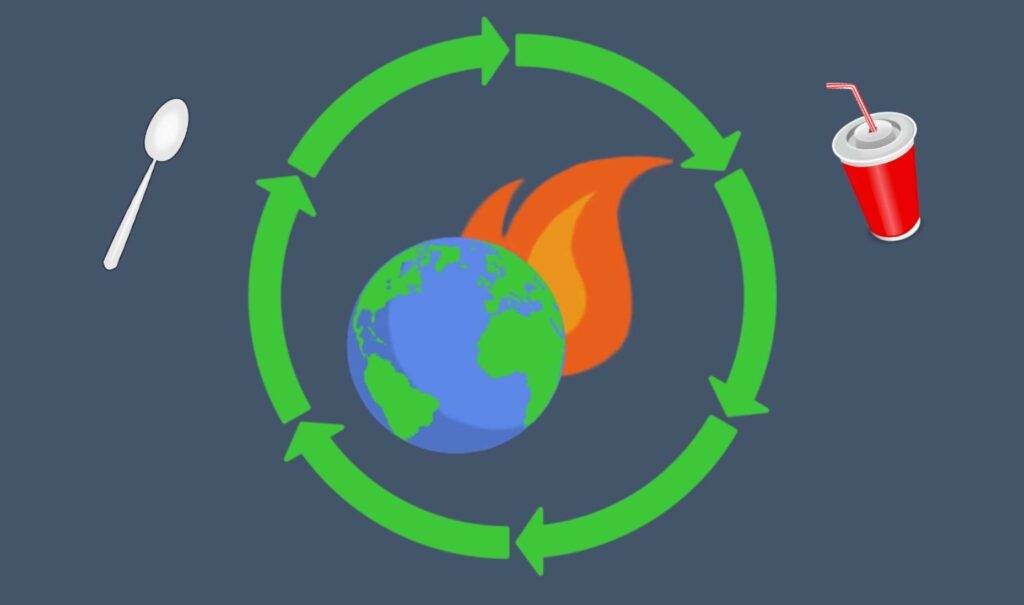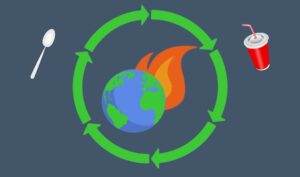In early 2023, Tim Hortons will be rolling out new cutlery, packaging, and lids across Canada. Recyclable fibre lids and wooden cutlery are among the changes they are making in an attempt to eliminate single-use plastics and reduce waste in general.
Tim Hortons has already begun trials of the hot beverage fibre lids in Vancouver, and the response has been mixed, to say the least. While some people have applauded the coffee giant for their innovation in the name of environmental sustainability, others have amassed on Twitter with pitchforks and torches in hand.
The complaints, ranging from lids getting soggy to coffee being infused with a horrible flavour, can be summed up by the following widespread notion: “worse than paper straws.”
With so many Canadians in an uproar over this change despite its eco-friendly nature, the question as to whether humanity is prepared to deal with climate change must be asked.
And the answer is no. If people are adamant on keeping plastic straws and lids because paper and fibre ones are a bit inconvenient, then the answer is definitely, without a shadow of a doubt, no.
Of course, not everyone who dislikes these changes is unwilling to address climate change. Many have argued that the new lids are a poor alternative, and that Tim Hortons should try to come up with a better alternative that doesn’t compromise convenience. This is reasonable. Some people, however, care not for environmental sustainability and simply long for the superior plastic straws and lids. That is not reasonable.
The real question, then, is why? Why, despite most people knowing that climate change is a legitimate problem, are so many of us reluctant to act or make sacrifices for the good of our world? In order to get to the bottom of this question, a deep dive into the human mind is required.
Tomorrow’s Problem
Many people lack a sense of urgency, believing climate change to be a problem of the distant future. This mindset, common amongst people who say things such as, “I’ll get to that tomorrow,” or “I’ll do it later,” or “that’s ages away!” is perhaps the main cause of our inaction towards addressing this crisis.
Think about a time when you had a final exam coming up. A month before the exam, you might have thought, I’ve got all the time in the world to study, and promptly decided to binge watch a TV show. This is essentially the attitude some people have towards climate change. Now, recall the week before the exam, when you were likely thinking, I really should have started studying earlier. This will be the attitude towards climate change in the (not so distant) future when we realize that we probably should have been doing something about the crisis a little earlier.

A girl falling asleep when she really ought to be studying for her exam.
Photo by: CollegeDegrees360/CC BY-SA 2.0
The construal level theory may help explain this phenomenon of putting things off, whether its not taking action to combat climate change because it seems like a distant problem, or watching YouTube videos instead of working because there are funny dog videos that you haven’t seen yet.
The construal level theory suggests that our understanding and opinions of things depends on how psychologically distant (in terms of space, time, etc.) the thing is to us. For example, if you were to make plans for a summer vacation, your plan would likely differ depending on if the vacation is happening in a week versus a year.
This theory may suggest, then, that the severe lack of action towards dealing with the climate crisis is due to it being psychologically distant in many people’s mind.
…If only the answer was that simple. In reality, people’s reluctance to deal with climate change is far more complicated and has a lot to do with the way the issue is communicated to the public.
Ejelöv et al., who conducted a study on the construal level theory in relation to climate change, found that people feel basic emotions, such as fear, more intensely when something is psychologically proximate to them. Conversely, they found that people feel self-conscious emotions, such as guilt, more intensely when something is psychologically distant.
With scientists and governments focusing on making climate change feel more immediate, they are neglecting to appeal to people’s self-conscious emotions: emotions such as shame and guilt that sully our morality and compel us to act. This failure to effectively communicate the climate crisis is largely to blame for the absence of urgency. It is also to blame for the consequential reaction of the public, being something along the lines of, “sounds pretty serious, someone should probably do something about it.”
Ejelöv et al. proposed that communication surrounding climate change would be more likely to spur action if it appealed to both basic emotions and self-conscious emotions, rather than solely relying on basic emotions.
Emotional Heart, Logical Brain
Other studies delve further into this notion of appealing to emotions in order to encourage climate action: they suggest that emotions are actually a greater motivator than logic!
In one such study, it was concluded that a failure to engage both the emotional and rational brain is to blame for inaction. Furthermore, the study determined that while appealing to the rational brain with facts makes people believe that there is a crisis, appealing to the emotional brain with forms of communication such as personal storytelling is what motivates individuals to act.
Another study came to a similar conclusion, stating that the lack of urgency is the result of inadequate personal and emotional involvement with the subject—people are unwilling to adjust their lifestyles for a cause they can barely relate to or sympathize with.
It seems that there is a consensus that presenting evidence is a poor motivator, and that emotions are the key to spurring climate action.
If Star Trek taught us anything, it is that problems can only be effectively solved through the joining of logic and emotions. Spock’s reasoning was always logical, but his lack of morals would often result in his decision-making being at the detriment of others. Bones, the doctor of the USS Enterprise, was concerned about doing the morally right thing above all else, but his highly emotional state would cloud his judgement from time to time. Captain Kirk, however, possessing both the reasoning of Spock and the morals of Bones, always knew how to best resolve issues. Be more like Kirk.

Are We Doomed?
It’s clear that we need to change our method of communicating climate change if we want to see real change, and if we want to steer away from this destructive course we are currently on.
If you recall, the standardization of paper straws was sparked after a video of a plastic straw being removed from a turtle’s nostril surfaced. Essentially, an emotional situation which triggered an outcry led to paper straws, not facts about single-use plastics and their negative impact.
It’s the responsibility of the government, then, to better engage people in caring about this pressing issue. In order to do this, they must engage people’s emotions, notably self-conscious ones. Rather than just going on about how immediate the consequences of climate change are to spread fear and worry, the government should communicate how these consequences will affect the future generations to make individuals feel ashamed for throwing the burden of climate action onto their children and grandchildren.
Having said that, the public also has a responsibility to stop putting climate change off, and to hold the government to the same standard. After all, policy changes in favour of climate action will only happen if the people demand them and see their governments following suit themselves.
Words by: Liam Basi





